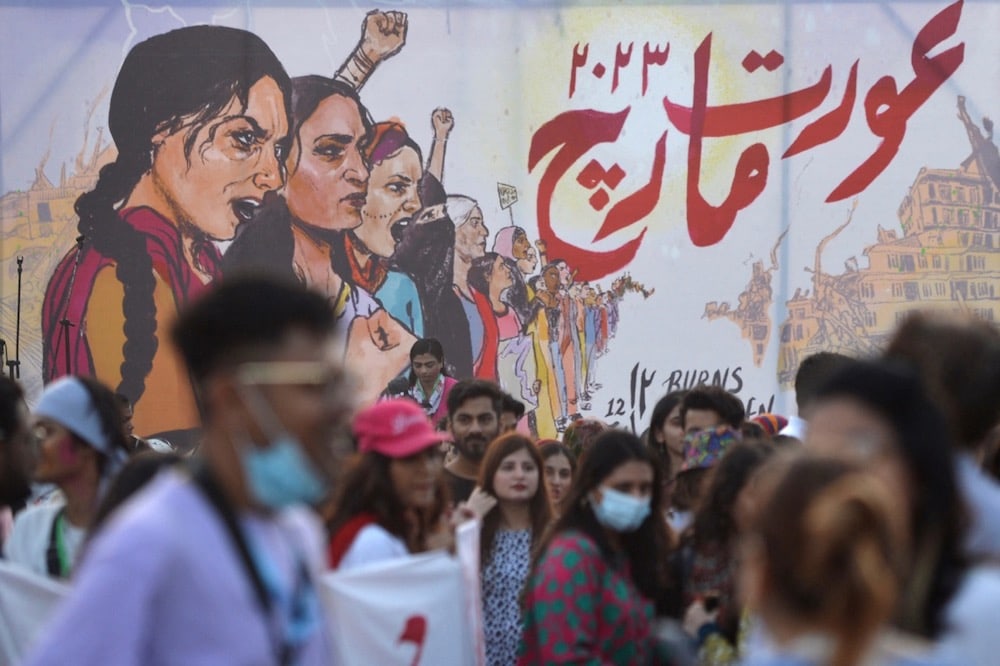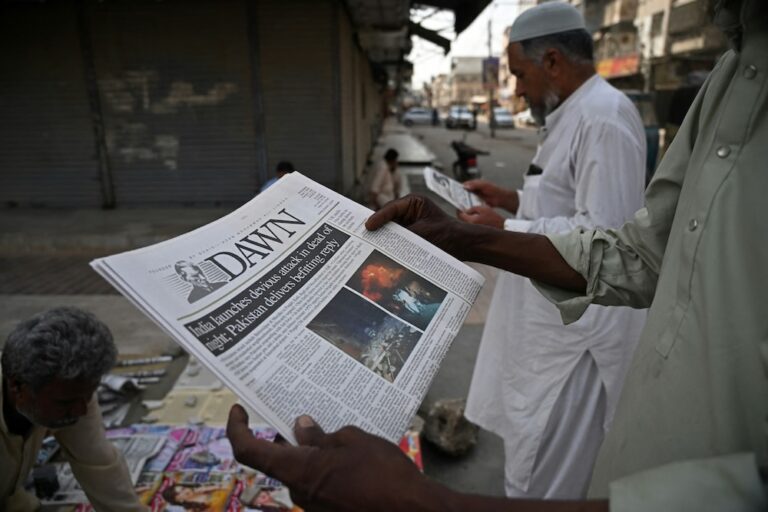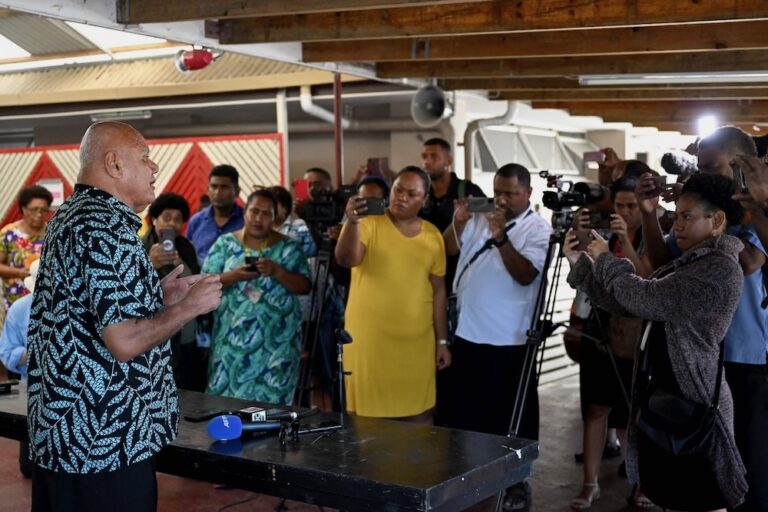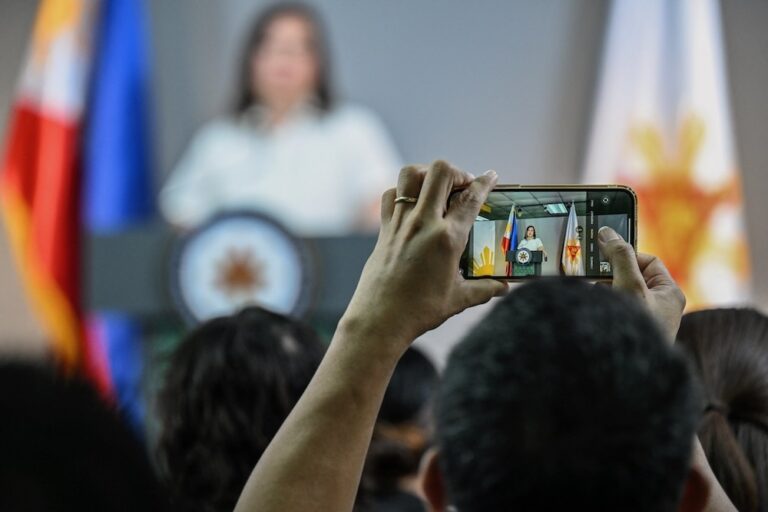March 2023 in Asia-Pacific: A free expression round up produced by IFEX's regional editor Mong Palatino, based on IFEX member reports and news from the region
Mongolian legislators voted down a dangerous social media bill, alarming attacks against journalists across South Asia, and intimidating tactics used against organisers of women’s marches in Pakistan and Malaysia.
Mongolia rejects proposed controversial social media bill
On 17 March, the Parliament of Mongolia voted to uphold the veto of the country’s president on the proposed Law on the Protection of Human Rights in Social Media.
Earlier, media groups including IFEX member Globe International Center had called for the rejection of the measure, which would have granted authorities overly broad powers to regulate, monitor, and remove social media content.
“Its provisions could risk undermining human rights by negatively impacting press freedom and the right of citizens to express opinions.”
IFEX had also issued a statement in March urging legislators to consult with stakeholders in drafting laws that affect the public’s right to information.
More good news
China released Hong Kong publisher Yiu Mantin, who had spent a decade in detention after being convicted on accusations of smuggling. He was arrested on 27 October 2013 while preparing to publish a book by a dissident writer.
In Pakistan, freelance journalist Syed Fawad Ali Shah was released on bail after being charged with defamation for his reporting on alleged corruption within law enforcement agencies. He had been a refugee in Malaysia since 2011 but was secretly deported to Pakistan in August 2022.
Notable interviews
China’s media and COVID 19. The Committee to Protect Journalists(CPJ) interviewed Chinese video journalist Li Zehua, who was among the first to report about the spread of the coronavirus in 2020 in Wuhan. He was later arrested, ‘quarantined’, and released under supervision. He made it out of China and is now pursuing studies in the US. Asked about the state of media in China, he said that “there is no freedom. There’s no media. There is only propaganda.”
He also underscored the importance of having an open media to tackle health emergencies.
“The more media freedom [and] freedom of speech we had, the less the disease would have spread. The disease was a scientific problem. We could have removed the political factors from the scientific discussion.”
Digital rights. SEEMA magazine, which regularly features South Asian diaspora women, interviewed technology lawyer Mishi Choudhary, who is the founder of IFEX member SFLC.in and an IFEX council member. Choudhary summed up the aims of SFLC.in in campaigning for digital rights in India.
“People must demand from their governments that they receive the benefits of digital transformation, with their power to govern themselves with respect to their rights under the rule of law increased, not traded away for “convenience.” That means using technology, politics, and law in concert for the true public interest. To do so means beginning by defining users’ rights, and we help people do that.”
#StopVNtrolls. In an interview with Global Voices, human rights group Viet Tan shared its recent study about Vietnam’s notorious military cyber unit, Force 47, which has been linked to vicious troll operations on Facebook that target state critics and activists. It also signed a letter with 60 other global groups urging Meta to review its policies and decisions affecting human rights groups.
“Provide an avenue for Vietnamese activists, journalists and stakeholders to appeal content takedowns and to work directly with Facebook staff when targeted by coordinated social harm campaigns.”
Attacks against journalists across the region
On 11 March, at least 19 journalists were injured during a bomb attack on a cultural center and office of the news agency Afghan Voice (AVA) in Balkh province. Around 100 people were gathered for the event marking National Journalists’ Day. Journalists were among those interrogated by security forces, even though the Islamic State group has claimed responsibility for the bombing as “punishment” against those “working in agencies involved in the war and instigation against IS.” Among the fatalities: AVA reporter Hosein Naderi, the first journalist killed this year in Afghanistan. The Afghanistan Journalists Center urged authorities to end impunity. “We strongly condemn the attack and call on authorities to bring the perpetrators to justice at once and to put in place all possible means to limit the risks.”
There have been several alarming arrests in India and Kashmir. On 12 March, police in Uttar Pradesh arrested Sanjay Rana, a 19-year-old reporter with Moradabad Ujala newspaper, after a local leader from the ruling party accused him of being a “fake journalist” and disrupting a government activity. CPJ notes that his arrest and investigation “appear to be retaliatory measures aimed at silencing his critical questioning of a state official.”
On 18 March, Haryana police arrested Jaspal Singh, a TV journalist who reports part-time for the local broadcaster News18 Haryana. Earlier, the son of a local politician accused the journalist of posting alleged defamatory messages against authorities in two private WhatsApp groups.
In Kashmir, Wande Magazine editor Irfan Mehraj was arrested on terrorism charges in Srinagar before being transferred to New Delhi. Reporters Without Borders (RSF) asserted that “special laws intended to combat terrorism should not be used to suppress the activities of journalists.” His case was cited by Mary Lawlor, UN Special Rapporteur on the situation of human rights defenders, to point out how Indian authorities have used the Unlawful Activities (Prevention) Act “as a means of coercion” against civil society, the media, and human rights defenders.
In Maldives, police assaulted and arrested news website Avas reporter Hussain Juman on 16 March while covering a rally of supporters of the opposition Progressive Party of Maldives. Later, a local court ordered Juman’s release. There has been a concern about the restrictions that authorities may impose on media reporting ahead of the country’s presidential election in September.
In Bangladesh, at least nine journalists were assaulted by the police while documenting the clash between lawyers supporting the ruling Awami League party and the opposition Bangladesh Nationalist Party on 15 March. The police have already apologized but have yet to make anyone accountable for attacking journalists.
On 29 March, Prothom Alo correspondent Shamsuzzaman Shams was arrested under the draconian Digital Security Act. A supporter of the ruling party has filed a complaint against the journalist for “false news” in relation to an article about soaring food prices. CPJ described the arrest of Shams as an “excessive reaction by authorities that smacks of intimidation.” A first investigation report was also filed against Prothom Alo editor and publisher Matiur Rahman.
Meanwhile, RSF reported that another relative of an expatriate journalist was attacked in Dhaka. Mahinur Khan, the younger brother of expatriate journalist Zulkarnain Saer Khan, was attacked on 17 March by four men armed with steel bars who also filmed the incident while shouting that the victim is a family member of the critical journalist.
Aurat March and #WomensMarchMY
This year, women’s marches in Pakistan and Malaysia encountered restrictions and intimidations from authorities and religious conservatives.
In Pakistan, Aurat March [Women’s march] was organized in Lahore, Karachi, and Multan – but the permits granted by local authorities imposed several restrictions, which included instructions about refraining from inviting guests from a specific sect and posting controversial statements on social media.
Writing for IFEX member Media Matters for Democracy, Usman Shahid noted that “through structured disinformation and hate campaigns”, the Aurat March is “labelled a threat to the religion, institution of marriage and family structure.” He added:
“Despite the demands being publicly laid out in its manifesto, the movement continues to be attacked with misleading narratives and baseless allegations online.”
In Malaysia, police summoned organisers of the women’s march held on 12 March for allegedly violating national laws. The police echoed the observations of some religious hardliners who had spotted pro-LGBTQI+ banners during the march. Nalini Elumalai, senior Malaysia Programme Officer at ARTICLE 19, reminded authorities of its commitment to uphold the constitutionally-guaranteed right to freedom of expression and assembly.



